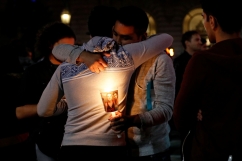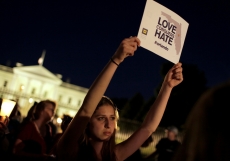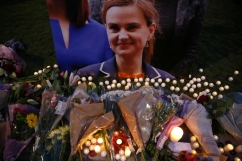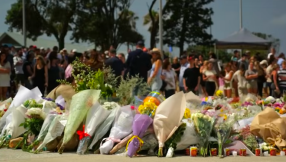The universe is a place of astonishing grandeur. Picture the moon spinning around us at 2,300 miles an hour. Picture our earth spinning around the sun at 66,000 miles an hour. Our sun is one of 200 million other suns and trillions more planets in the Milky Way, and each one of those suns and planets is spinning around our galaxy at 483,000 miles an hour. Picture millions of carousels all swirling round in one great luminous sea – that's our galaxy. And that galaxy is just one of 100 billion other galaxies hurtling through space at over one million miles an hour.
The universe is mind-bogglingly immense. In comparison, our little earth is no bigger than a pebble, and our individual lives are no greater than a grain of sand. And yet according to Scripture, the God who keeps those galaxies spinning picks out that pebble, looks at each microscopic person on it and says: "I'm here. I care. I'm listening." King David said God attends to our every moment – watching as we sit and rise, listening for every thought (Psalm 139:1-16). Jesus said every hair on our heads has been counted by God, and that he knows every word of our prayers before they're spoken (Matthew 10:30; 6:8). The One who keeps those heavenly carousels spinning knows us in intimate, caring detail.
That's all very nice to say when times are good, however. It can be much harder to believe on weeks like this when 49 people are murdered and 53 more are injured in the Orlando tragedy. When a French policeman and his wife are killed in another Islamist attack. When a young Yorkshire MP – applauded by all who knew her as a wife, mother, politician and humanitarian of astounding compassion – is killed so brutally. Jo Cox dedicated her life to those who needed a voice, including refugees. We can wonder how a good and loving God was caring for people like her in 'intimate detail' this week.
We know quite a bit about what motivates Islamist-style hate crimes. In days to come, we may know more about the motives of Jo Cox's killer, Thomas Mair. But many questions will be left unanswered. They always are. This tiny pebble of a world has big problems, and there are no easy answers to human suffering.
When the biblical character Job went through tragedy, losing his health, livelihood and family (Job 1-2), he was given few answers as to why those atrocities happened. Instead, he was shown the grandeur of the world as evidence of God's care and goodness (38-41). The experience left him speechless (42:1-6).
When King David spoke of God's caring attention, he did so in brutal times. "If only you, God, would slay the wicked!" he goes on to say in Psalm 139:19. "Rescue me, Lord, from evildoers; protect me from the violent, who devise evil plans in their hearts and stir up war every day," (Psalm 140:1-2). David spoke in the midst of trouble.
And when Jesus spoke of our hairs being numbered, he didn't speak as some spiritual gypsy frolicking through the daisies of some imaginary utopia. His was an era of racial tension, political turmoil and outright terrorism. It was an era of regular crucifixions.
All this is to say that when Scripture talks of God's knowing of us in intimate, caring detail, it doesn't do so out of naiveté. The idea is found in the midst of a violent, rubble-strewn world.
Brendan Cox gave a brave response to his wife's murder last night. He said he, his family and friends were going to work every day of their lives against the hate that killed Jo. Many will join him, vowing to use peaceful means diametrically opposed to those of Islamists and other purveyors of violence.
For me, the immense beauty and grandeur of the universe says this venture won't be in vain. Our grand cosmos and all its tiny pebbles were not built by and for hate, but by and for a Love who is brighter than the stars, One who is reconciling all the broken pieces back to himself (Colossians 1:15-22). Jesus' resurrection from death makes that theory an historical reality, a glimpse of what he'll ultimately achieve.
That means in the end hate will not have the final say.
Love will win out in the end.
Sheridan Voysey is a writer, speaker and broadcaster, frequently contributing to faith programs on BBC Radio 2. His books include Resurrection Year: Turning Broken Dreams into New Beginnings and Resilient: Your Invitation to a Jesus-Shaped Life. Follow him on Facebook and Twitter, and get his free ebook Five Practices for a Resilient Life.
















